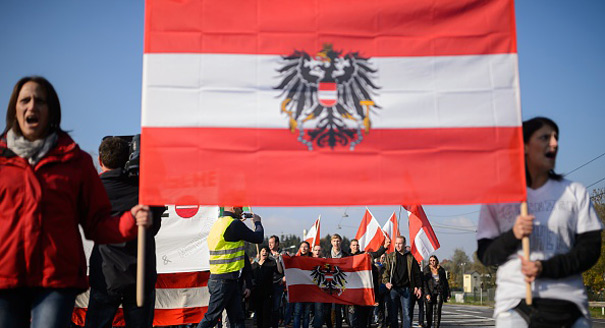If Alexander Van der Bellen wins the Austrian presidential election on December 4, the world will not care much. Not because this seventy-two-year-old economics professor, an independent candidate and former leader of the Austrian Green party, is a boring man—on the contrary. But for many, Van der Bellen is just a normal candidate who could become a president with largely ceremonial duties and a responsibility to safeguard and uphold democratic values in the small republic of Austria.
Yet 2016 is the year of radical-right madmen. If the other candidate wins the election, another extremist with open contempt for European values will enter the stage of Western politics. Norbert Hofer, the third speaker of Austria’s parliament, represents the far-right Freedom Party of Austria (FPÖ). In Hitler’s country of birth, the news of Hofer’s victory would be especially poignant. What is more, this election will set the stage for the next parliamentary vote.
Would an extreme-right president of Austria mean the dawn of the Fourth Reich? Not quite. Austria is a parliamentary republic, where, unlike in France, the president has no real power. The Austrian president is more like the British queen, who theoretically appoints and approves ministers but in practice does what the prime minister asks for. Except that Hofer has threatened repeatedly to use all the theoretical powers of the president’s position—including the right to dissolve the parliament and govern with emergency decrees.
These special powers were given to the president in 1929, when Austria’s young democracy felt pressured by antiparliamentary, paramilitary forces. For decades, these provisions of the Austrian constitution were seen as a safety net against a resurgence of the extreme Right. If Austrians elect Hofer on December 4, it will be like putting a fox in charge of the henhouse.
The forty-five-year-old politician has a young face, but he believes in an old ideology. During the election campaign, he tried to portray himself as moderate, electable by a centrist majority. Like his party, he presents himself as the candidate for people left behind by the elite establishment. But Hofer belongs to the extreme wing of the FPÖ.
He is a proud member of a German nationalist fencing fraternity called Marko-Germania in his hometown of Pinkafeld. This in itself does not make him a Nazi. There is no threat of a renewed movement to annex Austria to Germany as in 1938. But German nationalism was the breeding ground for Aryan ideology, the white supremacist racism that considered Jews, Slavs, and colored people beneath the German race.
Today, Hofer is crusading not against Jews but against foreigners, immigrants, and refugees, many of whom are Muslims. “Islam is not a part of Austria,” he said at a campaign rally at the beginning of November. Extreme-right candidates in Austria have a different odor from those in other European countries. Austria, in alliance with Germany, committed the Holocaust. This gives the country a special responsibility not to tamper with Nazi-inspired language and policies.
In 2013, Hofer co-published the Manual for Liberal Politics for FPÖ civil servants, a handbook that the Documentation Center of Austrian Resistance classified as representing the extreme Right. According to this publication, the FPÖ’s ultimate goal is negative net migration, and foreigners in Austria should be “sent back to their homeland.”
Hofer’s victory could also mean an Austrian exit from the EU. The Manual for Liberal Politics states that “for the FPÖ, leaving the European Union . . . is not a taboo, but ultima ratio,” or the last resort. If the EU does not agree to deep reforms, an FPÖ president might call for a referendum on Austria’s EU membership. A so-called Öxit would make Austria poorer. The country of 8.5 million people has profited tremendously from being a member of the EU. But voters might not care, just as Brits voted against their own interests when in June 2016 they opted to leave the EU.
This alone is reason enough for other EU member states to take notice of the Austrian election: a Euroskeptic winning the presidency in Vienna might strengthen similar forces in upcoming elections in the Netherlands, France, and Germany. Hofer also dreams of forming a closer political alliance with the far-right governments in Hungary and other EU member states in Eastern Europe.
But Austria’s presidential election is only the first act in this political drama. An early parliamentary election is likely to be held in 2017. The governing Social Democrats (SPÖ) and Christian Democrats (ÖVP) are best described as dead men walking. According to an opinion poll in November 2016, the far-right FPÖ leads with 33 percent, followed by the SPÖ with 27 percent and the ÖVP with 19 percent.
Austrian Chancellor Christian Kern, a former manager of the Austrian Federal Railways and leader of the SPÖ, has not ruled out holding talks with the head of the FPÖ, a dental technician called Hans-Christian Strache. But Strache might find an eager junior partner in the ÖVP. The conservative foreign minister, Sebastian Kurz, has employed harsh right-wing populism to prepare himself, his party, and the country for a possible coalition with the FPÖ.
An Austrian government that includes the far-right FPÖ would have major ramifications for the EU. Even a small country can do a lot of damage in Europe. Austria has proved this before.
Tessa Szyszkowitz is an Austrian journalist and historian. She writes for the Austrian news magazine profil and other publications.






